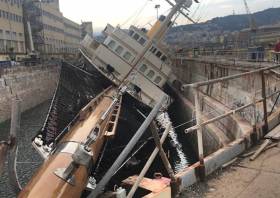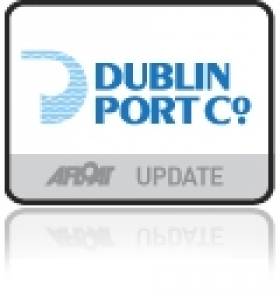Displaying items by tag: Denis O'Brien
Denis O’Brien Superyacht In Listing Incident At Italian Dry Dock
Four people were reportedly injured when a superyacht owned by Irish media mogul Denis O’Brien listed while being relaunched from a dry dock in Italy.
According to Boat International, the 90-metre Nero was in the process of being moved out of the dock at Amico & Co in Genoa yesterday (Tuesday 10 September) when a support panel apparently gave way, causing the vessel to list dangerously in the dock on its port side.
It’s not yet known what damage has been caused to the popular charter yacht, part of the 1920s-inspired Corsair range, which was purchased by Denis O’Brien in 2014 for around €40 million and underwent a significant refit in Barcelona in 2016.
A statement from Döhle Yachts, which manages Nero, says the yacht listed at a 30-degree angle but "did not contact the dock wall and appears to have suffered only minimal damage".
The statement added that there was no risk to the environment and "no serious injuries" were sustained, with all crew safely disembarking after the incident, which is under investigation.
This story was updated on Thursday 12 September to include the statement from Döhle Yachts.
O'Brien Backing Dublin Shipping Services Hub Scheme
#DublinPort - Billionaire businessman Denis O'Brien is behind an ambitious plan to make Dublin Port an international shipping services hub for the maritime industry, as The Irish Times reports.
The scheme has been presented to Dublin City Council as part of its call for submission on rezoning land in Dublin's Docklands area, already home to the Irish Financial Services Centre (IFSC).
It appears that the plan put forward by a company called ISSC Dublin - of which O'Brien is understood to be a financial backer - aims to do for shipping what the IFSC did for the international finance sector.
The Irish Maritime Development Organisation (IMDO) and IDA Ireland are also said to be involved in the ambitious project, which has the potential to create thousands of jobs.
The Irish Times has much more on the story HERE.
Denis O'Brien Buys Former BJ Marine 'Docklands' Warehouses for €1m
#QUAYCAPITAL - Businessman Denis O'Brien has spent about €1 million on the purchase of two campshire warehouses, fronting the south quays of the Liffey in Dublin's Docklands quarter.
The campshires are the stretches of land between the quay and road on both the north and south quays in Dublin, which in times past, were thronged with warehouses during the days when cargoships used to sail this far up the Liffey.
Mr O'Brien is expected to spend almost as much again on the upgrading and refurbishment work before renting the buildings as restaurants or for other retail uses.
The detached buildings at Sir John Rogerson's Quay date from the 1880s and were handed over to Nama after the Government decided to dissolve the disgraced Dublin Docklands Development Authority.
Selling agent CBRE said most of the considerable number of inquiries it received about the former BJ Marine warehouses came from the catering industry because of their unique quayside location in an area where a large number of professional workers are employed.
"There is obviously a growing demand for services in what has now become a vibrant business district," says Niamh Sheehan, who handled the sales. For more on this story, the Irish Times has a report.


























































